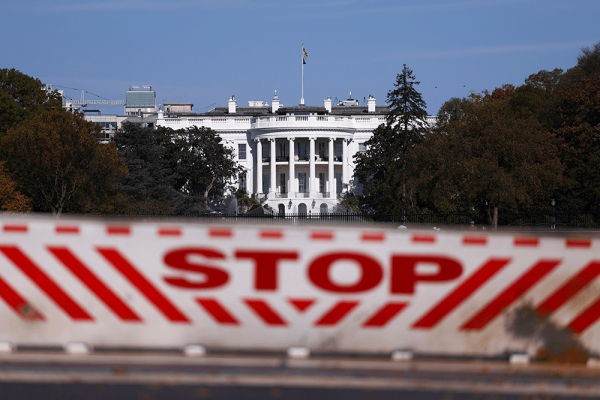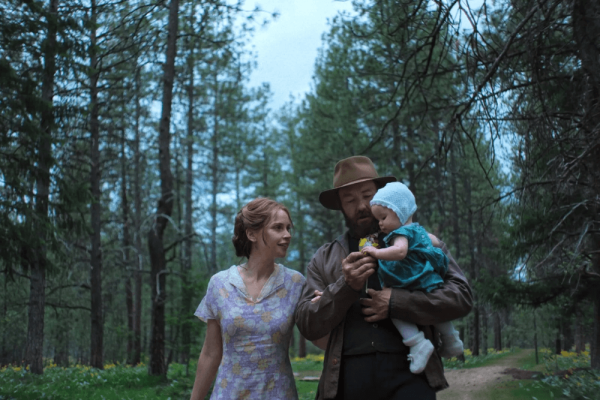Donald Trump will return to the White House, according to projections from the Associated Press.
His campaign was marked by racist and misogynistic rhetoric, promises of authoritarian tactics including dramatic expansion of executive power and retribution for his political rivals, as well as policies that appealed to the anxieties of conservative religious communities, especially Christians.
As faith and justice leaders absorbed the news of a second Trump term, many pointed to the importance of fostering and caring for self and neighbor while figuring out what to do over the next four years.
In public statements and comments to Sojourners, leaders working on mental health, democracy, pluralism, poverty, peace, and other justice issues shared responses ranging from grief and rage to compassion and resilience. They shared advice, prayers, and challenges for the days and weeks ahead.
Melissa Florer-Bixler, theologian, author of How to Have an Enemy, and pastor of Raleigh Mennonite Church, told Sojourners:
“On days like today, I remind myself that the most significant, radical, course-changing movements for justice in our world erupted during times of intense and catastrophic repression.
The anti-apartheid movement intensified after the Afrikaner nationalist party blocked all legal forms of protest by non-white people. The LGBTQ+ movement was born during a time of brutal police crackdowns on the public gathering of gay people. When Rosa Parks refused to give up her seat on the bus, interracial marriage was illegal, and most Black people couldn’t vote. The Black Lives Matter movement followed the murder of George Floyd catalyzed during Trump’s horrific first term.
Movements are born not in times of peace but at the center of struggle, forged in fire, and shaped by hope.”
Carlos A. Rodríguez, founder and CEO of The Happy Givers, a Puerto Rico-based nonprofit that provides meals, rebuilds homes, and operates a community farm on the island, told Sojourners:
“My prayer today takes the form of farming. With my hands in the dirt, I plant new seeds for our community farm, grounding myself in the rhythms of creation and resistance. This land, an American colony, bears the weight of a democracy in which we have no voice. We cannot vote in the presidential election, yet Trump’s presidency is imposed upon us, whether we consent or not. And so, we farm — not merely because it sustains us, but because it is an act of defiance, a way to cultivate life in the face of oppression.
Like many marginalized groups in America, we are all too familiar with the dangers of a Christianity entangled with nationalism. This toxic blend seeks to enthrone one ultimate power: white patriarchy. It’s a system that uses faith as a tool to dominate, to silence, and to exclude. The problem is not that Christians want Trump to be more like Jesus (it’s clear now that this is not a concern). The problem is when they want Jesus to be more like Trump. This is Christian nationalism at its core — a theology that reshapes the Prince of Peace into a figure of power and control, aligning faith with the values of empire.
This has always been the story of American democracy, a democracy that offers us nothing but figures like Trump — leaders who perpetuate the very structures of inequality and division. But here, in this soil, we resist. Each seed we plant is a quiet act of rebellion against a system that would rather see us powerless. It is a testament to our hope that, even under the weight of empire, life can flourish. We do not bow to the false idols of nationalism disguised as faith. Instead, we root ourselves in a gospel that proclaims liberation, a kingdom where every person is seen, heard, and valued.”
241106-trumpreact2.png
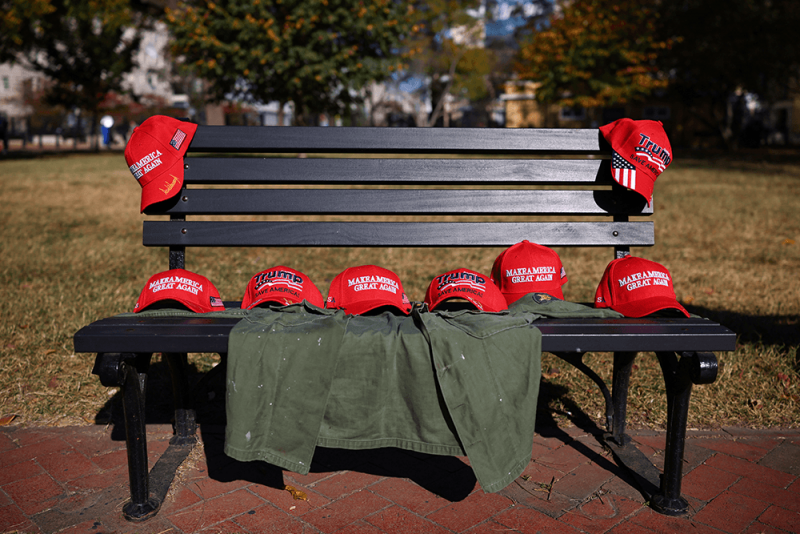
Lydia Wylie-Kellermann, author, activist, and executive director of the Kirkridge Retreat and Study Center, told Sojourners:
“Beloveds, there are no words. Shock. Rage. Grief. I feel my queerness running through my veins exposed … yet still holy. This is not the day to rise and organize. Those days will come. Today, let our bodies melt into the earth. Let us weep and welcome silence. Let us wrap our arms around our children and sleep when we can and eat chocolate and tell one another over and over again that we love one another. The tears, the earth, the love, are somehow going to carry us.”
Rev. Mae Elise Cannon, executive director of Churches for Middle East Peace, told Sojourners:
“It is yet to be seen what a Trump presidency might mean for the Middle East. On one hand, former President Donald Trump has been quoted in the media as telling Prime Minister Netanyahu to ‘finish the job’ in regard to the destruction, devastation, and defeat of Hamas in Gaza that has now resulted in more than 43,000 deaths. On the other, he reportedly has communicated it is time for the war in the Middle East to be brought to a swift end.
Historically, the policies of the Trump administration have unilaterally favored Israel and ignored the needs and aspirations of Palestinians. We hope and pray that is not the case for his second term! We kneel before God, on behalf of all of the people in Palestine, Lebanon, Israel, and other parts of the Middle East and pray for an end to all violence and a future of peace. We at Churches for Middle East Peace, in coalition with our 30-plus member communions, and our partners around the world commit to continuing to work for a comprehensive permanent ceasefire; an end to the decades-long occupation and oppression of the Palestinian people; and a future that assures human rights, equality, and security for Palestinians, Israelis, and all in the Middle East.”
Matthias Roberts, psychotherapist, author, and LGBTQ+ faith educator told Sojourners:
“I just hope people will allow themselves to feel all the grief and anger and despair they have within themselves. Connecting to our bodies, to our humanness, feels more important than ever right now.”
241106-trumpreact3.png
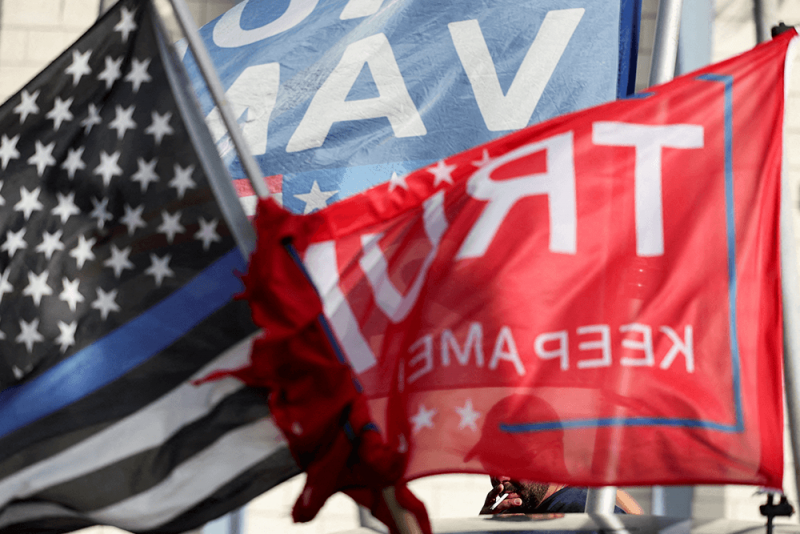
Eboo Patel, founder and president of Interfaith America, a nonprofit dedicated to pluralism and democracy told Sojourners:
“Reach for a candle, and light it. Tell your friends.”
Amanda Tyler, BJC executive director and lead organizer of the Christians Against Christian Nationalism campaign, told Sojourners:
“I pray for the safety and protection of the most vulnerable in our society to the authoritarian regime we have just voted into office. I am clear eyed about the challenges that lie ahead, but more resolved than ever to resist. I encourage people of all faiths and none to unite across our differences to love our neighbors, to reject Christian nationalism and to organize for change as we create the beloved community wherever we live.”
Jeanné Lewis, CEO of Faith in Public Life Action, wrote in a news release:
“As faith leaders, we are called to be courageous and resist those who seize power for personal gain. The divine teachings and sacred scriptures of our diverse traditions compel us to prioritize our collective humanity and dignity, and to ensure the inherent worth of every human being is upheld.
We are committed to the work ahead and to resisting the implementation of Project 2025. This agenda seeks to separate families, imposes inaccurate views on race and gender, and hides important information about our health and safety.
We condemn in the strongest terms any intimidation tactics that seek to undermine the democratic process and further harm vulnerable people. Instead, we must use our collective moral power to resist violence and to pursue nonviolent action to build a future of freedom and dignity for all.”
Bill McKibben, climate activist and founder of 350.org told Sojourners:
“I pray that people will take a walk outside and remember the beautiful world the Lord gave us, and then resolve to protect whatever of it we still can.”
Christopher Wimbush, interim president of Catholics for Choice, said in a statement:
“For our 50-year history, Catholics for Choice has taken a hard look at religious overreach and the legacy of Christian nationalism that Catholic men, including the Catholic bishops, have promulgated. They are all too often the architects of attacks on abortion rights, LGBTQIA+ inclusion, and gender equality. We fear that with the results of this election, those right-wing forces will become more emboldened to advance their anti-woman, anti-LGBTQIA+ agenda. Catholics for Choice will be here for those who will join us in pushing back against this distortion of our faith.”
Jemar Tisby, historian, author, and speaker, wrote on Threads:
“Let’s not move immediately on to the next fight and resist phase. Let’s feel first. The exhaustion. The grief. The worry. The anger. Even the despair. These feelings need not last forever, but neither should they be suppressed or ignored. Take the time you need to process.”
241106-trumpreact4.png
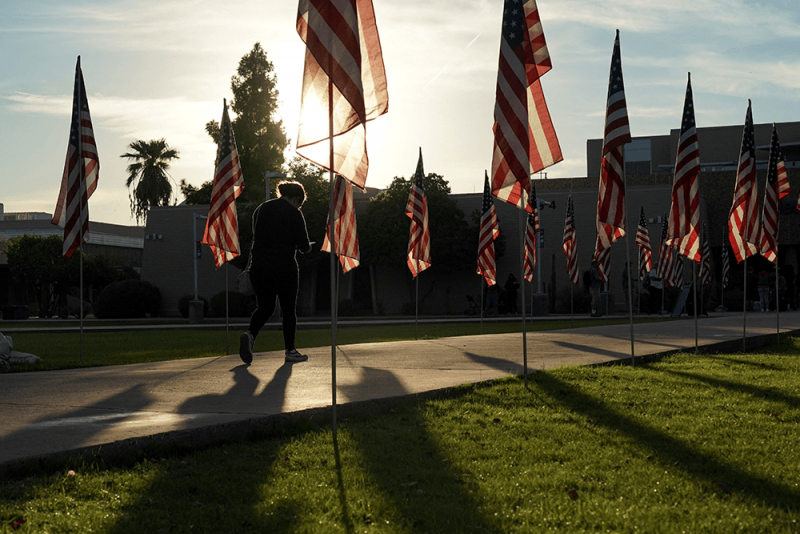
Ruth Padilla DeBorst, theologian and facilitator of International Fellowship for Mission as Transformation, told Sojourners:
“To all who are grieving today, as am I along with so many others: Let’s breathe deep, hold, breathe, hold. Let’s cry freely, hold, cry, hold. Let’s hug tight, hold, hug, hold. Let’s gift ourselves unrushed time for this.
Then, let’s recall the sound advice and affirmation of the psalmist: ‘Do not put your trust in princes, in human beings who cannot save … Blessed are those whose hope is in the Lord their God … who upholds the cause of the oppressed, gives food to the hungry … The Lord reigns forever’ (Psalm 146).
Finally, let’s join fellow followers of Jesus from the world round, in heeding this call.”
Bishop Dwayne Royster, executive director of Faith in Action, wrote in a public statement:
“We awake this morning with prayers of lament in our hearts, but not without hope. We stand on the shoulders of our ancestors as we follow God’s command to seek justice and protect the most vulnerable. We commit to organizing with all our power to confront and blunt white Christian nationalism, hate, and the promised authoritarianism to come. We rest in the confidence of the people of faith and moral courage who have opposed authoritarians since biblical times. Now is no different. Faith without action is hollow; this is the belief at the crux of our mission to build a new America rooted in justice and equity in which all people are afforded dignity and self-determination.
Our organizing extends far beyond the ballot box. In the coming days and weeks, we will fight to protect our families from being torn apart and our children orphaned by inhumane immigration policies. We will defend the progress we have made in reducing incarceration, holding police accountable, and making our economy work for working people. We will continue to organize to lower rents and make childcare affordable. We will step forward to stop Black women and other people from being threatened and targeted. We will protect our schools and health care and oppose dangerous and reckless policies in Project 2025 and other proposals. Our democracy’s strength lies in its people; it is us, not just politicians, who form the foundation of our democratic systems. I urge everyone to remember our shared commitment to organize for justice and, in the words of the late great John Lewis, to ‘make good trouble.’”
Jonathan Kuttab, Palestinian human rights lawyer and executive director of Friends of Sabeel North America, told Sojourners:
“Those who were optimistic that their votes leading to a Harris win would ameliorate the problems of racism, xenophobia, misogyny, sexism, genocide, or social injustice must be really devastated by the prospect of another Trump presidency. I was not optimistic, but I am full of hope in God’s sovereignty and will only use the elections results as an added incentive to work harder for peace and justice.
Micah 6:8 says: ‘What does the Lord require of you: to do justice, love mercy, and walk humbly before your God.’ Walking humbly means we do not think we can rely on our votes to end the injustices we fight, but must humbly trust God for the ultimate outcome, which is definitely the victory of good over evil.”
Julian Davis Reid, artist-theologian and creator of Beside Still Waters: A Notes of Rest Offering, told Sojourners:
“My advice for U.S. Christians of faith and justice is to be present to our emotions before God. We who oppose the vile stances and demeanor of Trump and his cronies cannot just be about solution-oriented logic.
The country has spoken a harrowing message about the power of whiteness, fear, and hatred to rule the day. Such a statement should draw us into a vulnerable state of sitting before God whose Son still bears the mark of empires in his wrists.
God, who remains our shepherd and host, will lead us beside still waters and through the valley of the shadow of death as we create, advocate, and dream still.”
Rev. Malcolm Foley, theologian and author of The Anti-Greed Gospel, told Sojourners:
“I address my challenge to those who can abide in the necessary hope. Regimes of evil operate with a consistent infrastructure, revealed to us in John’s visions in Revelation: propaganda, military violence, and economic exploitation.
The people of God, on the contrary, must be a people of truth, of peace, and of economic solidarity. By the power of the Spirit and in spite of the powers and principalities, we can and must be so.”
Ryan Cagle, farmer, theologian, and co-organizer of Jubilee House in Alabama, told Sojourners:
“My challenge to those feeling the weight of this election outcome is to tend to your fear, acknowledge your grief, and care for your body and soul in whatever ways you need over the course of the coming days. Take the time you need to scream, pray, curse, and find some sense of solace among those you love and care for, and when you catch your breath, get to work!
Freedom may be a constant struggle, but the kin-dom of God is in our midst! This is good news! As abolitionist John Brown once wrote, ‘I cannot remember a night so dark as to have hindered the coming day.’ I pray that these words bring you comfort and hope in these uncertain times. May you know, in the full assurance of faith, that a different world is possible.”
Michael Wear, CEO and president of the Center for Christianity and Public Life, told Sojourners:
“Our faithfulness is not measured or vindicated by election outcomes. We must develop a positive vision for faithful service in this moment. I encourage people of faith to assess as honestly as possible what genuine and edifying lessons are to be drawn from the election results, and then commit to serving as agents of peace and stalwarts of justice in the days ahead.”
Elaina Ramsey, executive director of Faith Choice Ohio, a faith-based reproductive justice group, sent Sojourners this prayer:
“God of Mourning, draw near to all who are grieving and raging over this heartbreaking election.
Comfort your people, especially anyone fearing pregnancy in a land that claims to care for children and families yet withholds the dignity of bodily autonomy.
Bless those in need or want of gender-affirming care and abortions in the uncertain months and years to come. May you be their portion.
Be with us through all manner of injustices, that we may build a better world in the shadow of the one we dwell in this day.”
Kelly Brown Douglas, theologian and visiting professor at Harvard Divinity School, told Sojourners:
“Calling ourselves a democracy, where there is freedom and justice for all, has always been an aspirational proposition. On Tuesday, the country declared that aspiration invalid. And so, my prayer is that the church will live into its aspirational claim of being church. I pray that the church will bear witness through protest and advocacy to God’s just future where all are respected as the sacred human beings that they are. It is time for the church, without ceasing, to be church.”
Betsy Shirley contributed to the reporting of this article.
Editor’s note: This article was updated on Nov. 7 to add responses from Malcolm Foley, Ryan Cagle, Michael Wear, and Elaina Ramsey and on Nov. 8 to add a response from Kelly Brown Douglas.
Got something to say about what you're reading? We value your feedback!
